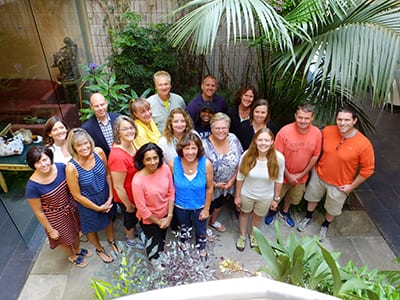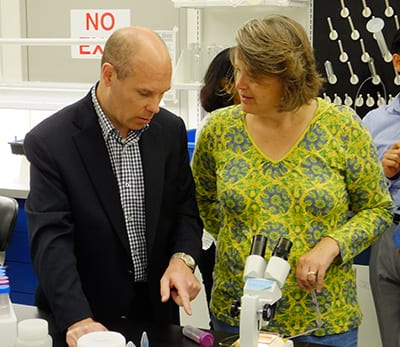Program Background
The Bioenergy and Bioproducts Education Program (BBEP) was a multiinstitutional collaboration among educators and scientists at Boyce Thompson Institute (BTI) and Cornell University as well as historically black and land grant universities in the eastern United States. The program recently finished in its fifth year (2011–2015) and, over the last four years, BTI educators have engaged 445 teachers and nearly 7,000 students through BBEP-related activities. In addition to the summer institute, the BTI education team has presented BBEP classroom activities at regional workshops throughout New York State and elsewhere in the Northeast.
The Bioenergy and Bioproducts Education Program links teachers and their classrooms with scientists developing biofuel technology as well as plant-based renewable energy sources and products. The backbone of this program is teacher professional development: utilizing bioenergy and bioproduct systems as a platform to engage grades 7–12, community college, and preservice teachers in cross-cutting science, technology, engineering, and math (STEM) education. To do so, BTI educators and BBEP partners offer teacher institutes with hands-on and instructional activities that unify core principles in chemistry, environmental science, plant biology and biotechnology, and sustainable agriculture. Lesson plans and collaborative learning activities, including classroom materials, are provided to institute participants. These activities and materials are designed to deepen student competencies in an understanding of science and engineering practices fundamental to the production, distribution, and consumption (pipeline) of biofuels and bioproducts. Students are encouraged to have fun with “science inquiry,” think broadly (systems thinking), and apply their conceptual knowledge in biology, economics, and environmental and life sciences to agricultural and engineering challenges within emerging “green technologies.” To sustain participant engagement upon completion of the BBEP institute and beyond, teachers receive classroom support (e.g., activity or laboratory supplies/kits) and follow-up consultations with BTI-BBEP educators through social media and/or classroom visits.
Teacher participants and BTI’s program instructors complete the 2014 summer institute and prepare to bring BBEP learning to classrooms across the country.
BBEP Institute 2014. Middle school teacher Kenneth Huff (Left; Williamsville Central School, NY) and high school teacher Betsy Vinton (Right; The Harley School, NY) examine a new device developed by Dr. Arum Han’s laboratory at Texas A&M University to rapidly screen alga cells for growth and oil production. Dr. Han collaborates with Dr. David Stern’s laboratory (BTI) to demonstrate and advance this nanobiotechnology.
BBEP Summer Institute Highlights
Click Here for an example of the agenda
BBEP Institute 2014. Middle school teacher Kenneth Huff (Left; Williamsville Central School, NY) and high school teacher Betsy Vinton (Right; The Harley School, NY) examine a new device developed by Dr. Arum Han’s laboratory at Texas A&M University to rapidly screen alga cells for growth and oil production. Dr. Han collaborates with Dr. David Stern’s laboratory (BTI) to demonstrate and advance this nanobiotechnology.
Conduct hands-on laboratories (wet labs) involving the culture of perennial biomass crops and algae, plant-pathogen interactions, anaerobic digestion of urban waste, conversion chemistry of biomass-to-liquid transportation fuels, and bioproducts.
Receive classroom materials for more than twenty laboratories and activities aimed at building student’s interest and science literacy in sustainable bioenergy systems.
Tours of biomass cropping systems (e.g., switchgrass and shrub willow) as well as research greenhouses and field sites.
Attend seminars and participate in open discussions with leading scientists in biomass production systems, liquid biofuels, renewable energy crops and resources, and environmental policy; providing a deep understanding of the “bioenergy pipeline” and the challenges ahead in developing “green technologies.”
Professional Development: Upon completion of the workshop…
- Each participant earns a program certificate and development credit hours.
- Current year participants remain in contact throughout the year through social media.
- Teachers collaborate with BTI educators to individualize and revise BBEP learning activities to fit their classroom, improving their application across diverse student audiences.
- As BBEP alumni, teachers have the opportunity to pilot and assist in the development of new BTI educational resources and classroom laboratories!
Testimonials: What part of the institute was most useful? Why?
- “Learning about sustainability and getting new insight into possible activities and projects that are appropriate for middle school students. Before the workshop, I had little knowledge about the ‘big picture’ of sustainability. I needed information and activities that would align with a STEM program.” – Sandra Clark (Sullivan County Schools, TN)
- “Completing the labs; because, it gave me the confidence to implement them in my own classroom.” – Heather Krieger (Heim Middle School/Williamsville Central School, NY)
- “Validated activities I already integrate into my program as well provided me with alternative means and ideas to expand my program.” – Dr. James Jacob (Tompkins Cortland Community College, NY)
- “Laboratory materials and activities, as they present me with tools I can immediately integrate into my curriculum.” – Kelly Mackey (Islip High School, NY)
The Bioenergy and Bioproducts Education Program (BBEP) is funded by the United States Department of Agriculture – National Institute for Food and Agriculture (award no. 2011-67009-30055) and the National Science Foundation.
BBEP Institute 2014. Teachers participating in the Perennial Biofeedstock Field Day hosted by the USDA-NRCS Big Flats Plant Materials Center (Corning, NY). Fun in the sun, from left to right: Kristen Lavelle and Diane LaChance (North Syracuse Central School District, NY); Janay Watson (preservice, Delaware State University); Heather Krieger (Williamsville Central School, NY); and Sandra Clark (Sullivan County Schools, TN).









